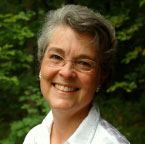 Carol Moran, MSW is a founding faculty member emeritus of Center for Family Consultation. She began her study of Bowen theory in 1976, and soon joined with others in the Chicago area to provide Bowen theory based programs. In 1985 she organized CFC’s post-graduate training program which she led until 2002. She moved to emeritus status in 2013.
Carol Moran, MSW is a founding faculty member emeritus of Center for Family Consultation. She began her study of Bowen theory in 1976, and soon joined with others in the Chicago area to provide Bowen theory based programs. In 1985 she organized CFC’s post-graduate training program which she led until 2002. She moved to emeritus status in 2013.
Carol’s research, teaching and conference presentations have focused on four main issues:
- Naturalistic inquiry as a method of research conducive to the development of Bowen theory
- Multi-leveled biological processes (gene, organ, individual, family and society) influential in the effort to define a sexual self
- Multi-generational emotional process influence on parent-infant psychobiological attunement and infant brain development
- Societal emotional process as a conceptual frame to understand crises in the United States, such as 9/11 and the Great Recession
Carol Moran earned her MSW at University of Illinois Chicago; and did her post-graduate training at the Georgetown University Family Center, when Murray Bowen MD was the principle instructor. From 1975 until 2013 she was in private practice in Wilmette, Illinois where she provided clinical services for individuals, couples and families, family-of-origin coaching for adults, and consultation to clinicians. From 1979 to 1985 she worked at New Trier High School’s Central Campus Learning Center where she developed a Bowen theory based clinical program for faculty, students and families.
Contact Information
You may contact Carol Moran via email using the form below.
Carol Moran Publications
Moran, C. (2008). 911: Societal emotional process and interlocking triangles. In P. Titelman (Ed.), Triangles: Bowen Family Systems Theory Perspectives, (503-521). New York: Hayworth Press.
——– (1991). Memories of Murray Bowen. American Family Therapy Association Newsletter, (44) Summer, 24-25.
——– (1980). Adolescent truancy: A family problem. The Family Center Report, 2(4), 7–9.

